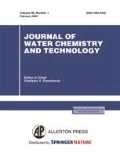Abstract
The timely restoration of water treatment devices is a prerequisite for sustainable water supply to consumers. Difficulties in estimating the moments of such recovery are associated with variability in the failure rate of mechanical systems. In this regard, two statistical approaches are proposed in this paper for scheduling the frequency of such recovery: estimating the constant frequency of maintenance for different groups of identical devices or systems (standard maintenance) or evaluating this frequency from the actual performance of individual devices (state maintenance). It is shown what approach should be used depending on the goal: to prevent devices from operation with expired service life or to make better use of the resource capabilities of these devices. It is also shown that the actual service life may significantly differ from its average value for groups of similar systems due to the influence of variability in the composition of source water and the characteristics of working units. Some limitations and recommendations on the practical implementation of forecasting the moments of unacceptably high losses in the performance-controlling parameter of water treatment devices and systems are considered. The novelty of this study is that it is based on the provisions of reliability theory, which provides a substantiated approach to the formation of a maintenance regime: the matter that becomes more urgent when designing water treatment technologies and equipment operation. The transition to these provisions, even in “advanced” areas of technology such as aerospace industry, encounters a number of difficulties, which the authors have managed to overcome in the case of water use problems to recommend the relevant specialists to pay attention to the potential efficiency of this approach and its use in the practice of operating water treatment devices and systems.
Similar content being viewed by others
REFERENCES
Goncharuk, V.V., Features of water origin on the planet Earth. New approaches to the assessment of water quality, J. Water Chem. Technol., 2018, vol. 40, no. 1, pp. 1–10.
ISO 24510:2007: Activities Relating to Drinking Water and Wastewater Services—Guidelines for the Assessment and for the Improvement of the Service to Users, Geneva: Int. Stand. Org., 2007.
ISO 24511:2007: Activities Relating to Drinking Water and Wastewater Services—Guidelines for the Management of Wastewater Utilities and for the Assessment of Wastewater Services, Geneva: Int. Stand. Org., 2007.
ISO 24512:2007: Activities Relating to Drinking Water and Wastewater Services—Guidelines for the Management of Drinking Water Utilities and for the Assessment of Drinking Water Services, Geneva: Int. Stand. Org., 2007.
GOST (State Standard) 31952-2012: Water Treatment for Units. General Requirements and Methods of Efficiency Determination, Moscow: Standartinform, 2014.
ITS 10-2015: Wastewater Treatment Using Centralized Wastewater Systems in Urban City Districts), Moscow, 2015.
SP 32.13330.2012. Oxidation-Reduction. Sewerage. Pipelines and Wastewater Treatment Plants, Current Version of SNiP 2.04.03-85, Moscow, 2019.
Kul’skii, L.A., Teoreticheskie osnovy i tekhnologiya konditsionirovaniya vody: protsessy i apparaty (Theory and Technology of Water Conditioning), Kiev: Naukova Dumka, 1983, 4th ed.
Munro-Faure, L. and Munro-Faure, M., Implementing Total Quality Management, London: Pitman, 1992.
Beichelt, F. and Franken, P., Zuverlässigkeit und Instandhaltung, Munich: Carl Hanser, 1984.
Alexandrovskaya, L.N., Aronov, I.Z., Kruglov, V.I., et al., Bezopasnost’ i nadezhnost’ tekhnicheskikh sistem. Uchebnoe posobiye (Safety and Reliability of Engineering Systems: Manual), Moscow, 2008.
Rozental’, O.M. and Aleksandrovskaya, L.N., Quality of water chemistry data, Water Resour., 2015, vol. 42, no. 4, pp. 500–507.
Kardashina, L.F. and Rozental, O.M., Khimiya, tekhnologiya i sertifikatsiya pit’evoi vody (Chemistry, Technology, and Certification of Drinking Water), Yekaterinburg: Ural. Otd. Ross. Akad. Nauk, 1997.
ICGM 106:2012. Evaluation of measurement data—The role of measurement uncertainty in conformity assessment, Paris: Joint Com. Guides Metrol., 2012.
Author information
Authors and Affiliations
Corresponding author
Additional information
Translated by E. Glushachenkova
About this article
Cite this article
Rosenthal, O.M., Alexandrovskaya, L.N. Statistical Estimation of the Service Life of Water Treatment Systems. J. Water Chem. Technol. 43, 8–13 (2021). https://doi.org/10.3103/S1063455X21010112
Received:
Revised:
Accepted:
Published:
Issue Date:
DOI: https://doi.org/10.3103/S1063455X21010112


